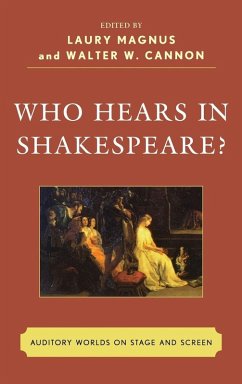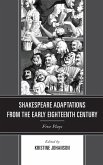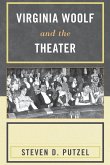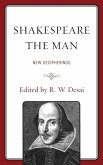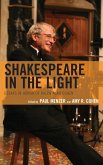Who Hears in Shakespeare?
Shakespeare's Auditory World, Stage and Screen
Herausgeber: Magnus, Laury; Cannon, Walter W.
Who Hears in Shakespeare?
Shakespeare's Auditory World, Stage and Screen
Herausgeber: Magnus, Laury; Cannon, Walter W.
- Gebundenes Buch
- Merkliste
- Auf die Merkliste
- Bewerten Bewerten
- Teilen
- Produkt teilen
- Produkterinnerung
- Produkterinnerung
This volume examines the ways in which Shakespeare’s plays are designed for hearers as well as spectators and shows how Shakespeare’s stagecraft, actualized both on stage and screen, revolves around various hearing conventions such as soliloquies, asides, eavesdropping, overhearing, and stage whispers. In short, Who Hears in Shakespeare? enunciates Shakespeare’s nuanced, powerful stagecraft of hearing.
Andere Kunden interessierten sich auch für
![Text, the Play, and the Globe Text, the Play, and the Globe]() Text, the Play, and the Globe128,99 €
Text, the Play, and the Globe128,99 €![Shakespeare Adaptations from the Early Eighteenth Century Shakespeare Adaptations from the Early Eighteenth Century]() Shakespeare Adaptations from the Early Eighteenth Century161,99 €
Shakespeare Adaptations from the Early Eighteenth Century161,99 €![Virginia Woolf and the Theater Virginia Woolf and the Theater]() Steven PutzelVirginia Woolf and the Theater60,99 €
Steven PutzelVirginia Woolf and the Theater60,99 €![Yeats, Shakespeare, and Irish Cultural Nationalism Yeats, Shakespeare, and Irish Cultural Nationalism]() Oliver HennesseyYeats, Shakespeare, and Irish Cultural Nationalism58,99 €
Oliver HennesseyYeats, Shakespeare, and Irish Cultural Nationalism58,99 €![Shakespeare the Man Shakespeare the Man]() Shakespeare the Man129,99 €
Shakespeare the Man129,99 €![Shakespeare the Man Shakespeare the Man]() Shakespeare the Man64,99 €
Shakespeare the Man64,99 €![Shakespeare in the Light Shakespeare in the Light]() Shakespeare in the Light117,99 €
Shakespeare in the Light117,99 €-
-
-
This volume examines the ways in which Shakespeare’s plays are designed for hearers as well as spectators and shows how Shakespeare’s stagecraft, actualized both on stage and screen, revolves around various hearing conventions such as soliloquies, asides, eavesdropping, overhearing, and stage whispers. In short, Who Hears in Shakespeare? enunciates Shakespeare’s nuanced, powerful stagecraft of hearing.
Produktdetails
- Produktdetails
- Verlag: Fairleigh Dickinson University Press
- Seitenzahl: 284
- Erscheinungstermin: 30. Dezember 2011
- Englisch
- Abmessung: 235mm x 157mm x 21mm
- Gewicht: 615g
- ISBN-13: 9781611474749
- ISBN-10: 1611474744
- Artikelnr.: 34105445
- Herstellerkennzeichnung
- Libri GmbH
- Europaallee 1
- 36244 Bad Hersfeld
- gpsr@libri.de
- Verlag: Fairleigh Dickinson University Press
- Seitenzahl: 284
- Erscheinungstermin: 30. Dezember 2011
- Englisch
- Abmessung: 235mm x 157mm x 21mm
- Gewicht: 615g
- ISBN-13: 9781611474749
- ISBN-10: 1611474744
- Artikelnr.: 34105445
- Herstellerkennzeichnung
- Libri GmbH
- Europaallee 1
- 36244 Bad Hersfeld
- gpsr@libri.de
Laury Magnus is professor of humanities at the US Merchant Marine Academy, Kings Point, New York. Her books include Lexical and Syntactic Repetition in Modern Poetry and her New Kittredge Editions of Romeo and Juliet, The Taming of the Shrew, The Comedy of Errors, and Measure forMeasure. Her essays and reviews appear in The Shakespeare Newsletter, Literature and Film Quarterly, Connotations, Assays, and College Literature. Her chapter on "Shakespeare on Film and Television" appears in The Oxford Handbook to Shakespeare. Walter W. Cannon is professor of English at Central College in Pella, Iowa, where he teaches early modern literature, including Shakespeare and his contemporaries. His essays and reviews have appeared in The Upstart Crow, Theatre History Studies, and Cahiers Élisabéthains. His chapter "The Poetics of Indoor Spaces" appears in Inside Shakespeare: Essays on the Blackfriars Stage.
Introduction by Laury Magnus and Walter W. Cannon
Part I. The Poetics of Hearing and the Early Modern Stage
Chapter 1: Why Was the Globe Round? by Andrew Gurr
Chapter 2: Guarded, Unguarded, and Unguardable Speech in late Renaissance
Drama by James Chapter 3: Hearing Complexity: Speech, Reticence, and the
Construction of Character by Walter . Cannon
Chapter 4: "if this be worth your hearing": Theorizing Gossip on
Shakespeare's Stage by Jennifer Holl
Part II. Metahearing: Hearing, Knowing, and Audiences, Onstage and Off
Chapter 5: Mimetic Hearing and Meta-hearing in Hamlet by Laury Magnus
Chapter 6: Hearing and Overhearing in The Tempest by David Bevington
Chapter 7: Asides and Multiple Audiences in The Merchant of Venice by
Anthony Burton
Chapter 8: "And Now Behold the Meaning": Audience, Interpretation, and
Translation in All's Well That Ends Well and Henry V by Kathleen Kalpin
Smith
Chapter 9: Hearing Power in Measure for Measure by Bernice W. Kliman,
Chapter 10: "Hark, a word in your ear": Whispers, Asides, and
Interpretation in Troilus and Cressida by Nova Myhill
Part III. Transhearing: Hearing, Overhearing, Whispering, and Eavesdropping
in Film and Other Media
Chapter 11: "Mutes or Audience to this Act": Eavesdroppers in Branagh's
Shakespeare Films by Philippa Sheppard
Chapter 12: Overhearing Malvolio for Pleasure or Pity: The Letter Scene and
the Dark House Scene in Twelfth Night on Stage and Screen by Gayle Gaski
Chapter 13: "But Mark His Gesture": Hearing and Seeing in Othello's
Eavesdropping Scene by Erin Minear
Afterword: Who Doesn't Listen in Shakespeare? by Stephen Booth
Part I. The Poetics of Hearing and the Early Modern Stage
Chapter 1: Why Was the Globe Round? by Andrew Gurr
Chapter 2: Guarded, Unguarded, and Unguardable Speech in late Renaissance
Drama by James Chapter 3: Hearing Complexity: Speech, Reticence, and the
Construction of Character by Walter . Cannon
Chapter 4: "if this be worth your hearing": Theorizing Gossip on
Shakespeare's Stage by Jennifer Holl
Part II. Metahearing: Hearing, Knowing, and Audiences, Onstage and Off
Chapter 5: Mimetic Hearing and Meta-hearing in Hamlet by Laury Magnus
Chapter 6: Hearing and Overhearing in The Tempest by David Bevington
Chapter 7: Asides and Multiple Audiences in The Merchant of Venice by
Anthony Burton
Chapter 8: "And Now Behold the Meaning": Audience, Interpretation, and
Translation in All's Well That Ends Well and Henry V by Kathleen Kalpin
Smith
Chapter 9: Hearing Power in Measure for Measure by Bernice W. Kliman,
Chapter 10: "Hark, a word in your ear": Whispers, Asides, and
Interpretation in Troilus and Cressida by Nova Myhill
Part III. Transhearing: Hearing, Overhearing, Whispering, and Eavesdropping
in Film and Other Media
Chapter 11: "Mutes or Audience to this Act": Eavesdroppers in Branagh's
Shakespeare Films by Philippa Sheppard
Chapter 12: Overhearing Malvolio for Pleasure or Pity: The Letter Scene and
the Dark House Scene in Twelfth Night on Stage and Screen by Gayle Gaski
Chapter 13: "But Mark His Gesture": Hearing and Seeing in Othello's
Eavesdropping Scene by Erin Minear
Afterword: Who Doesn't Listen in Shakespeare? by Stephen Booth
Introduction by Laury Magnus and Walter W. Cannon
Part I. The Poetics of Hearing and the Early Modern Stage
Chapter 1: Why Was the Globe Round? by Andrew Gurr
Chapter 2: Guarded, Unguarded, and Unguardable Speech in late Renaissance
Drama by James Chapter 3: Hearing Complexity: Speech, Reticence, and the
Construction of Character by Walter . Cannon
Chapter 4: "if this be worth your hearing": Theorizing Gossip on
Shakespeare's Stage by Jennifer Holl
Part II. Metahearing: Hearing, Knowing, and Audiences, Onstage and Off
Chapter 5: Mimetic Hearing and Meta-hearing in Hamlet by Laury Magnus
Chapter 6: Hearing and Overhearing in The Tempest by David Bevington
Chapter 7: Asides and Multiple Audiences in The Merchant of Venice by
Anthony Burton
Chapter 8: "And Now Behold the Meaning": Audience, Interpretation, and
Translation in All's Well That Ends Well and Henry V by Kathleen Kalpin
Smith
Chapter 9: Hearing Power in Measure for Measure by Bernice W. Kliman,
Chapter 10: "Hark, a word in your ear": Whispers, Asides, and
Interpretation in Troilus and Cressida by Nova Myhill
Part III. Transhearing: Hearing, Overhearing, Whispering, and Eavesdropping
in Film and Other Media
Chapter 11: "Mutes or Audience to this Act": Eavesdroppers in Branagh's
Shakespeare Films by Philippa Sheppard
Chapter 12: Overhearing Malvolio for Pleasure or Pity: The Letter Scene and
the Dark House Scene in Twelfth Night on Stage and Screen by Gayle Gaski
Chapter 13: "But Mark His Gesture": Hearing and Seeing in Othello's
Eavesdropping Scene by Erin Minear
Afterword: Who Doesn't Listen in Shakespeare? by Stephen Booth
Part I. The Poetics of Hearing and the Early Modern Stage
Chapter 1: Why Was the Globe Round? by Andrew Gurr
Chapter 2: Guarded, Unguarded, and Unguardable Speech in late Renaissance
Drama by James Chapter 3: Hearing Complexity: Speech, Reticence, and the
Construction of Character by Walter . Cannon
Chapter 4: "if this be worth your hearing": Theorizing Gossip on
Shakespeare's Stage by Jennifer Holl
Part II. Metahearing: Hearing, Knowing, and Audiences, Onstage and Off
Chapter 5: Mimetic Hearing and Meta-hearing in Hamlet by Laury Magnus
Chapter 6: Hearing and Overhearing in The Tempest by David Bevington
Chapter 7: Asides and Multiple Audiences in The Merchant of Venice by
Anthony Burton
Chapter 8: "And Now Behold the Meaning": Audience, Interpretation, and
Translation in All's Well That Ends Well and Henry V by Kathleen Kalpin
Smith
Chapter 9: Hearing Power in Measure for Measure by Bernice W. Kliman,
Chapter 10: "Hark, a word in your ear": Whispers, Asides, and
Interpretation in Troilus and Cressida by Nova Myhill
Part III. Transhearing: Hearing, Overhearing, Whispering, and Eavesdropping
in Film and Other Media
Chapter 11: "Mutes or Audience to this Act": Eavesdroppers in Branagh's
Shakespeare Films by Philippa Sheppard
Chapter 12: Overhearing Malvolio for Pleasure or Pity: The Letter Scene and
the Dark House Scene in Twelfth Night on Stage and Screen by Gayle Gaski
Chapter 13: "But Mark His Gesture": Hearing and Seeing in Othello's
Eavesdropping Scene by Erin Minear
Afterword: Who Doesn't Listen in Shakespeare? by Stephen Booth

